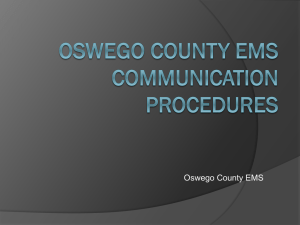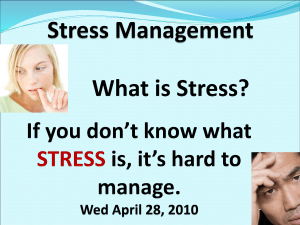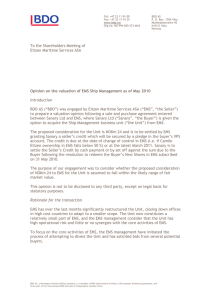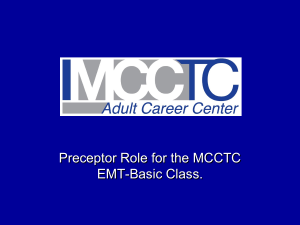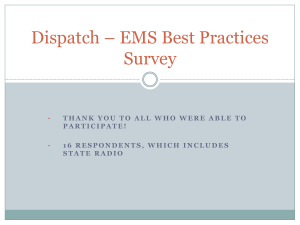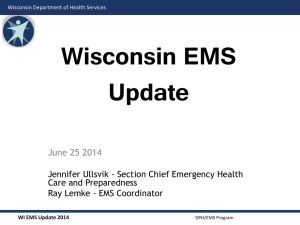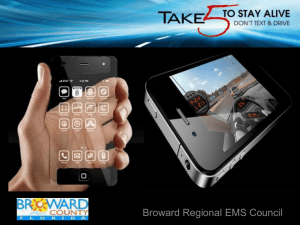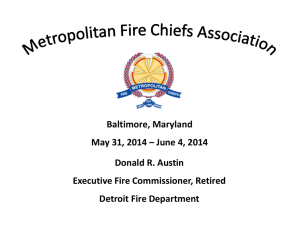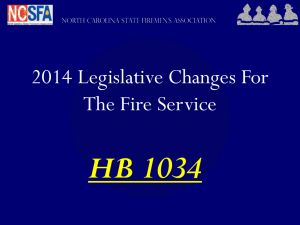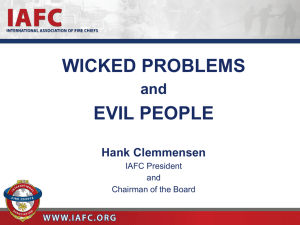ACT 37 Town Hall Meeting Informational PowerPoint
advertisement
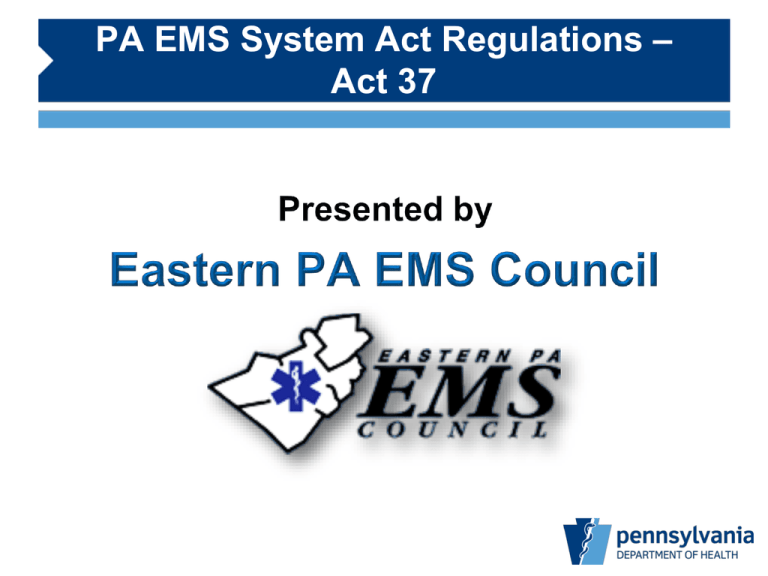
PA EMS System Act Regulations – Act 37 Overview • • • • • • • Future of EMS Regulations Update Continuing Education EMS Agencies Patient Care Reports Bureau Priorities Question/Answer Regulations Update • Submitted to Attorney General’s Office – August 27, 2013 • Promulgated in PA Bulletin on Oct. 10, 2013 • The regulations will be phased-in over a six month period. The outgoing regulations will be phased-out over the same time period • EMS System Act – The remainder of the Act will go into effect April 10, 2014 • The Department is not able to implement any of the new features created under the Act or the new regulations until April 10, 2014 Regulations Update (Continued) • CMP – EMS Providers – including non-certified providers (≤$1000); EMS Agencies – including unlicensed agencies & PCR Vendors (≤$5000) • The Department can issue conditional temporary licenses (provisional licenses) indefinitely if the Department determines it is in the public interest to do so. Previously, the Department could only issue these licenses for up to 18 months Regulation Update (Continued) • Even when some sections take effect, specific subsections within a section have their own phase-in periods – Example - EMS Agency Dispatch Centers • Use County EMD Program within 270 days after publication in PA Bulletin, which is 90 days after effective date of § 1027.4. • Use PEMA-certified Call-takers and Dispatchers within 2 years after publication in PA Bulletin, which is one and a half years after effective date of § 1027.4 Continuing Education • Lapse of Certification – Expired 1 Day to 2 Years • Con-Ed (All required CEU’s for 3 years prior to date of lapse AND up to time of reinstatement) • NREMT Cognitive Exam – 2 Years or Greater • Con-Ed (All required CEU’s for 3 years prior to date of lapse AND up to time of reinstatement) • NREMT Psychomotor Exam • NREMT Cognitive Exam Continuing Education • Testing Written (Cognitive) Testing • January 1, 2014 – ALL testing done via Pearson Vue system • Regardless of where you are in your attempts • Practical (Psychomotor Skills) Testing – Follow NREMT guidelines – Statewide testing calendar – Regions will work with Educational Institutes to develop planning and schedules Continuing Education • Scope of practice for EMS providers follows the EMS Scope of Practice Model that the National Association of State EMS Officials has developed for the National Highway Traffic Safety Administration • Licenses and certifications of EMS providers are permanent (subject to discipline), but continued practice is conditioned upon biennial or triennial reregistration and meeting Con-Ed requirements • Ambulance vehicle operators will now be certified, regulated, and required to meet Con-Ed requirements Continuing Education • The Act provides for the establishment of three new EMS providers – the Emergency Medical Responder (EMR), the Advanced Emergency Medical Technician (AEMT), and the Pre-hospital Physician Extender (PHPE) • The EMR replaces Ambulance Attendants and First Responders (§ 1023.23) – Current First Responders will be converted to EMRs automatically – Current Ambulance Attendants will be converted to EMRs automatically. There is a “grandfather” provision that permits Ambulance Attendants to remain as EMRs without full EMR certification for 2 years after the 6 month phase-in period for the regulations (April 10th, 2014) CONTINUING EDUCATION EMS PROVIDER OLD REQUIREMENTS + NEW REQUIREMENTS + CPR CPR EMSVO alone EMSVO & BLS EMSVO & ALS N/A N/A N/A 2 hours/2 years 3 hours/3 years 2 hours/2 years EMR FR – 16/3 years* 12 Med/Trauma, 4 Other/3 years* EMT 24/3 years* 18 Med/Trauma, 6 Other/3 years* AEMT N/A 27 Med/Trauma, 9 Other/2 years* Paramedic 18/1 year* 27 Med/Trauma, 9 Other/2 years* PHRN 18/1 year* 27 Med/Trauma, 9 Other/2 years* PHPE & PHP N/A 27 Med/Trauma, 9 Other/2 years* **ANY AMOUNT OF CEU’S, EITHER MED/TRAUMA OR OTHER, MAY BE DONE ONLINE** Continuing Education Credits • 1 Credit for every 60 minutes • Credits will be within 30 minutes blocks of time • If a student misses more then 15% of the time assigned for program, receives no credit **ANY AMOUNT OF CEU’S, EITHER MED/TRAUMA OR OTHER, MAY BE DONE ONLINE** Continuing Education • Con-Ed Tracking – PERSONAL responsibility – Get a completion certificate for ALL classes attended – Maintain Class completion certificates for a possible audit at time of re-registration Re-Registration Dates ALL Providers at ALS levels will now have re-registration dates. For initial renewal period, ALS providers will receive pro rated CEU’s to “balance” Con Ed requirements as follows: REMEMBER: It is the responsibility of each Provider to track completed and required CEU’s, and to have all required CEU’s completed by the renewal date on their card to remain “Command Eligible”. This information is readily available in each Providers individual EMSRS Account. There will be NO reminder notification sent. Gone Are The Days Revised, further defined use of Lights and Sirens policy - protocols When transporting or responding to a call involving a patient who presents or is in good faith perceived to present a combination of circumstances that may lead to worsened patient outcomes if additional medical interventions were delayed by the amount of time estimated to be saved by the use of emergency lights or audible warning devices. Lights and sirens may be used on an ambulance when transporting a patient ONLY when medical interventions is BEYOND the capabilities of the ambulance crew using available supplies and equipment Disciplinary Action • REINSTATEMENT OF REVOKED EMS PROVIDERS – Five (5) years prior to requesting – If request denied, applicant would wait one (1) year prior to secondary request. • DISCIPLINE OF EMSVO • • • • • Emergency Suspension – Clear and immediate danger to public – Department would need credible evidence – Hearing within 30 days The BEMS has the authority to…. Automatically Suspend a certification Agencies, Con-Ed/Education Institutes Command Facilities, PCR Software Vendors Civil money penalty for providers now in place. For Agency after April 10th, 2014 Impose civil money penalties against entities that conduct EMS operations without being licensed as an EMS agency. Accessing Your EMSR Accessing Your EMSR Accessing Your EMSR EMS Agencies • Ambulance Services Classified as EMS Agencies – Capabilities Licensed Under One License • Safety Committee Quarterly Meeting of Committee required • QI/PI Committee Quarterly Meeting of Committee required Peer Review – Peer Protection Members and employees of a peer review committee and persons who furnish professional services to a peer review committee. An individual who is a member or employee of a peer review committee or who provides professional services to a peer review committee conducting peer review under this section has the same protections from civil and criminal liability for the performance of any duty, function or activity required of the peer review committee as a person who performs the duty, function or activity under the Peer Review Protection Act. EMS Agencies • Staffing Plan EMS Agencies • Command Forms EMS Agencies (Continued) 1. Ground Ambulance Services – BLS; Intermediate ALS; and ALS (includes critical care transport ambulance services) 2. Air Ambulance Services 3. Water Ambulance Services – BLS; Intermediate ALS; and ALS 4. Squad Services – BLS; Intermediate ALS; and ALS 5. QRS 6. Special Operations EMS Services – Tactical EMS; Wilderness EMS; Mass-gathering EMS; and Urban Search & Rescue EMS 7. EMS Agency Dispatch Centers EMS Agencies (Continued) • EMS Agency Dispatch Centers (§ 1027.4) – Certification Required. Effective October 13, 2015, an EMS agency that operates an EMS agency dispatch center shall use call-takers and dispatchers who are certified and maintain certification as call-takers and dispatchers by the Pennsylvania Emergency Management Agency under 35 Pa.C.S. § 5303(a)(6) (relating to telecommunications management) • Must obtain an EMS agency license to operate an EMS agency dispatch center EMS Agencies (Continued) • Subject to certain exceptions, EMS agencies are required to operate 24-7-365 • Exceptions: – Conditional Temporary Licenses (§ 1027.12) A.K.A. Provisional Licenses – County or Broader Level EMS plan approved by the Department (§ 1027.6) – Tactical EMS response services except when their affiliated law enforcement service requests their assistance – Water Ambulances – Air Ambulances – Intermediate ALS Ambulance Services provided the EMS agency also operates a BLS or ALS Service at the same location EMS Agencies (Continued) • Special Operations EMS (§ 1027.41) – Tactical EMS • Provides EMS support to law enforcement during a tactical law enforcement operation – Wilderness EMS • Provides EMS in the wilderness, backcountry, or other wild, uncultivated area – Mass-Gathering EMS • Provides EMS where there is a large gathering of people under circumstances illustrated in the regulation – Urban Search & Rescue EMS • Provides EMS at an incident in which there patients entrapped by a structural collapse or other entrapment for an extended period of time EMS Agencies (Continued) • Stretcher and Wheelchair Vehicles An entity may not operate a stretcher or wheelchair vehicle to transport a person who the entity knows, or should reasonably know, requires: Medical Assessment Monitoring Treatment And/or observation during Transport Patient Care Reports • EMS Agencies shall collect, maintain, and electronically report complete, accurate and reliable patient data • Report should be complete no later than 72 hours after the EMS Agency concludes patient care • EMS Agency must submit, within 30 days, all PCR data to their ‘home’ Regional EMS Council • Upon transfer of care, the provider must provide, verbally and in writing or other means by which information is recorded, report to the individual at the receiving facility assuming patient care • Within 24 hours, the receiving facility shall receive a completed EMS PCR • PCR’s shall be retained by the EMS Agency for a minimum of 7 years Bureau Priorities • Safety – Providers • Wellness • Vehicle Operations – Patients’ • Error Reduction • Decision Making – Public • Vehicle Operations Bureau Priorities (Continued) • Personal Accountability • System Development – Advancement – Education vs Re-Education • Efficiencies & Effectiveness • Capacity Building & Preparedness Bureau Priorities (Continued) • Mass Casualty Incidents Event Planning Event Coordination Regional Initiatives Asset Management Thank you
